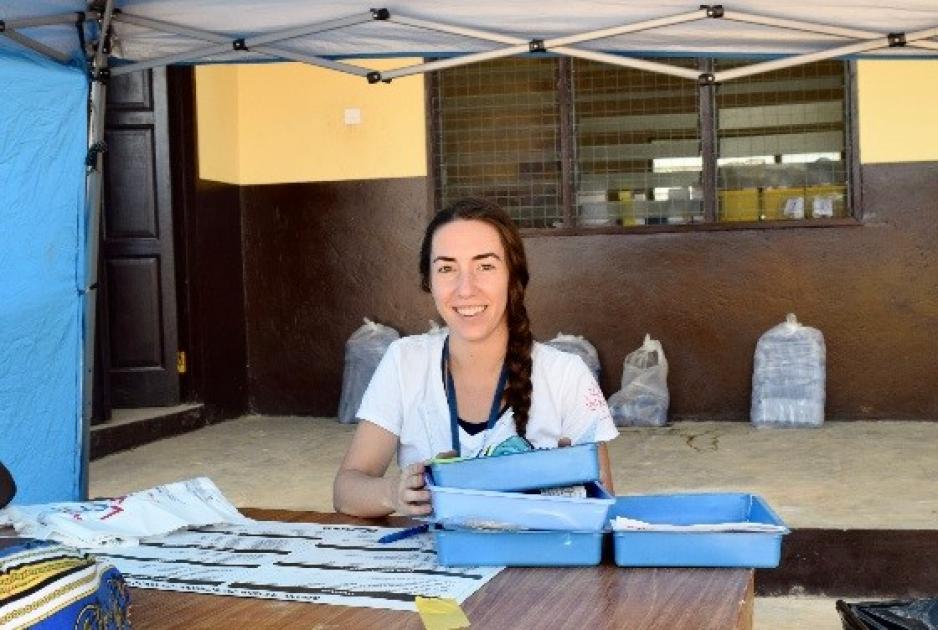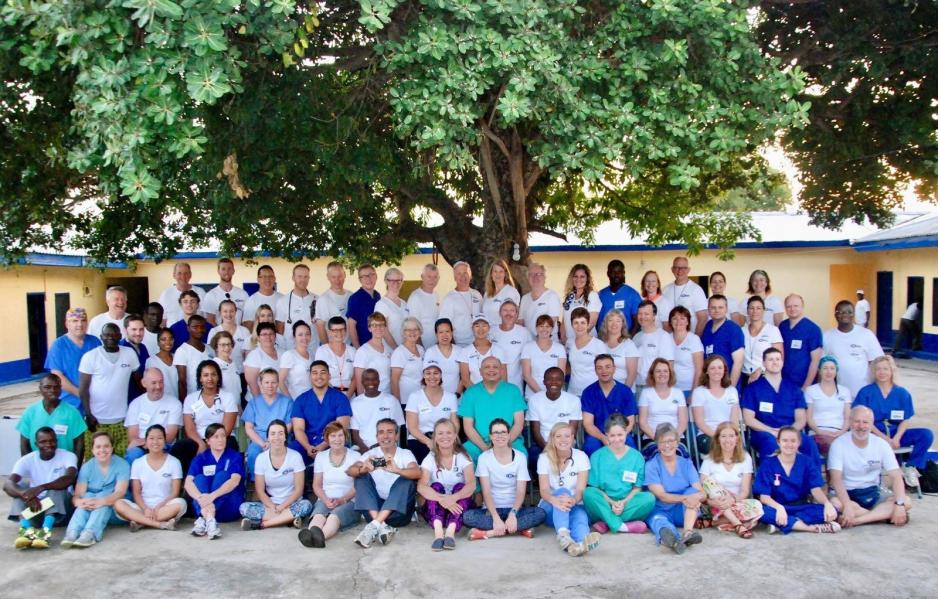Thanks to our Pharmacy Annual Fund donors, students like Élise De Francesco are able to expand their horizons by doing International Advanced Pharmacy Practice Experience rotations (APPE) during their fourth year of study. Élise traveled to Ghana where she had the opportunity to work with an international team of healthcare practitioners. She remarks, “It was truly a once in a lifetime opportunity that I will never forget. I was able to incorporate my pharmacy skills that I have acquired in Canada into my practice in Ghana. I learned more than I could have imagined along the way. This placement has taught me about cultural and global health issues, which I hope to translate into, better inter- professional skills and overall pharmacy practice in the future.
To read about the top 5 Lessons Élise learned in Ghana, please find her article below:
Changing lives with the Ghana Health Team: more than I imagined
As I looked out of my window on my way to the Pearson Airport, I had no idea what to expect. The past four months of preparation had left me in a state of anticipation, excitement, and apprehension for what was to come. The Canadian medical team boarded a flight from Toronto to Amsterdam and were soon joined by the UK surgical team. All 66 members of the Ghana Health Team travelled together from Amsterdam, to Accra, Ghana and then north to reach our final destination of Carpenter. It wasn’t until I stepped onto the red Ghanaian soil that reality set in. I was 8,704 kilometres from home. I was in Africa.
The two-week mission went by in the blink of an eye. The Ghana Health Team, led by Dr. Jennifer Wilson, a doctor and board member of the Ghana Rural Integrated Development, provided medical services in Carpenter and its surrounding villages to thousands of patients who could not afford care. The interprofessional team was composed of several sub groups, including a medical, nursing, pharmacy, dental, surgical, eye, and logistics team. The blistering 35 to 40 °C temperatures required some adjustment; however, they did not prevent me from learning more than I could have imagined.
I was very fortunate to have had the opportunity to complete an International APPE rotation in Ghana. If I had to narrow it down, my top five lessons learned are summarized below:
- Know your bugs, know your drugs:
One of the first things that we are taught when learning about infectious diseases is the antimicrobial spectrum. With the lack of electronic references available in Ghana, the high prevalence of infectious diseases, and the chaotic clinic days, the spectrum was essential knowledge for increased efficiency. Microorganisms aside, Ghana is also occupied by very large insects and I was given the (unfortunate) opportunity to acquaint myself with many of them.
- Communication is tricky, use all your resources
Although English is the official language in Ghana, it was not the native tongue spoken in the villages we visited. We were fortunate to have Ghanaian team members available to translate while we counselled medications. Due to the various languages spoken, we often required more than one translator to communicate effectively. This made communication a challenge and sometimes felt like a small game of “telephone.” In these circumstances, counselling villagers about medications (especially inhalers) was tricky. Despite this, I learned that body language is very important and that a smile goes a long way.
- Expand your scope, be prepared to adapt
Many of the pharmacy skills that I have acquired in Canada were transferable to practice in Ghana. Formulation adaptation, especially with antimalarials and analgesics, was one of the many tasks that I performed every day. While North American children frequently have difficulty swallowing pills, I was surprised at how non-problematic this was for Ghanaian children. I witnessed four-year-old children swallow tablets without issue. Thus, we rarely had to adapt tablets to a liquid formulation. Although there were many similarities with pharmacy practice, adaptation to a foreign culture, in terms of awareness and sensitivity, was necessary. Also, the differences in the Ghanaian and Canadian national formularies led to limitations when accessing medications.
- Interprofessional collaboration and resilience – living team values
The interprofessional team strived together to serve the people of Ghana and to support the sustainable development of their communities. Our team values of service, teamwork, sensitivity, professionalism, and resilience (and having fun) were incorporated into our work to provide patient-centered care. I quickly learned that collaboration was essential for success. Resilience was also particularly important as most days started as early as 5:45 am (or 5:20 am if you chose to go on a morning run) and ended late in the evening. The post-clinic snacks that we ate on the bus ride back to Carpenter were one of the many highlights of my day.
- The biggest culture shock can be returning home
Even though I was only in Ghana for just over 2 weeks, I found it easy to adapt to that lifestyle. Spending 24 hours a day, 7 days a week with 65 other people in a hot, busy, and unpredictable environment suddenly felt like the norm. It was strange to find that my own bed, without a mosquito net and without my roommates nearby, no longer felt like home. I missed hearing Dr. Jenn read her blog during breakfast (for those of you who are interested, her posts can be found here).
Weeks later, I still find myself thinking about my teammates and the people in Ghana, hoping that one day, I will return to Africa. This was an incredible experience and I would like to thank the Enhancing the Student Experience Fund (ESEF) Committee for making this placement in Ghana possible. I would also like to thank Ghana Rural Integrated Development (GRID) and Northern Empowerment Association (NEA) for welcoming me to the 2017 Ghana Health Team with open arms. And thank you to my preceptor, Dr. Linda Dresser, a Pharmacotherapy Specialist - Antimicrobial Stewardship at the University Health Network and Professor at the Leslie Dan Faculty of Pharmacy, for being an incredible mentor and friend throughout this rotation.
Please consider making a gift to the Leslie Dan Faculty of Pharmacy’s Annual Fund that provides students with real life experiences to put their leaning in to action outside of the classroom.
More News
Image
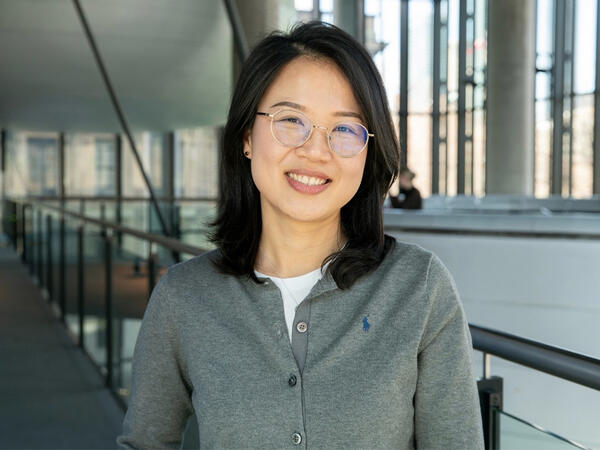
Grad to Watch: Jackie Fule Liu’s research focuses on better outcomes for diabetes patients
A recent PhD graduate, Jackie Fule Liu combines hands-on skill and big-picture thinking to help tackle diabetes care challenges.
Read More
Image
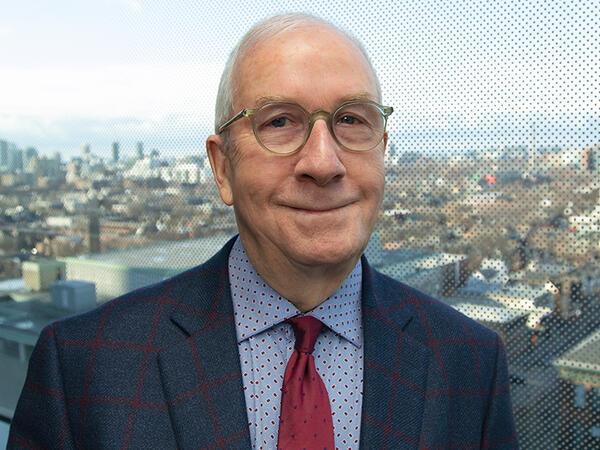
U of T community members recognized with Order of Canada
Congratulations to Dean Emeritus and Professor K. Wayne Hindmarsh on his appointment.
Read More
Image
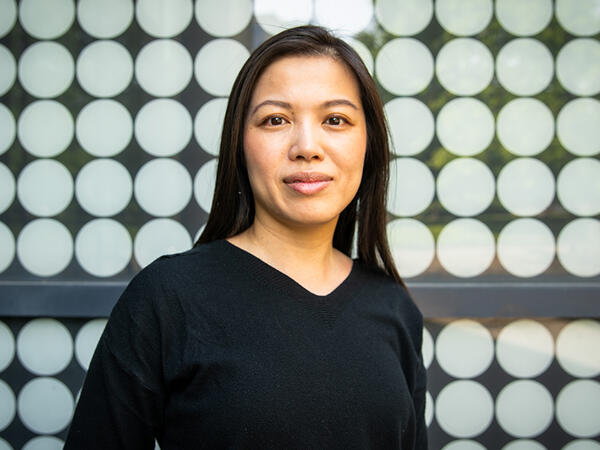
Welcoming Ivy Lam as Academic Lead in Climate, Health & Sustainable Care
Assistant Professor Lam will guide the Leslie Dan Faculty of Pharmacy's efforts to embed environmental sustainability across the Faculty.
Read More
